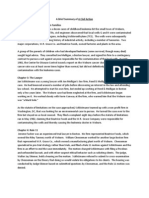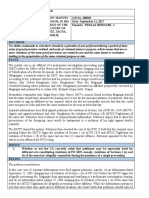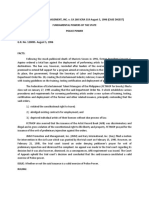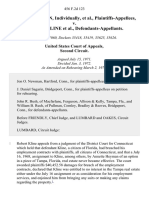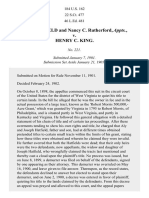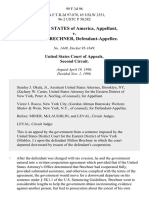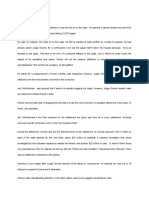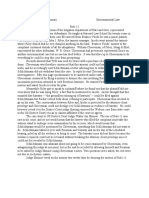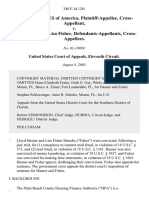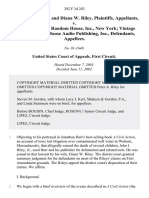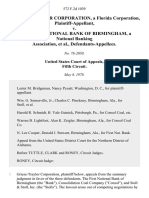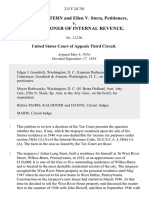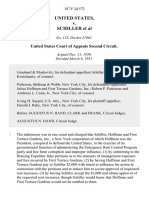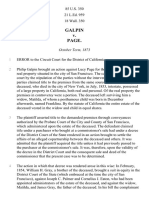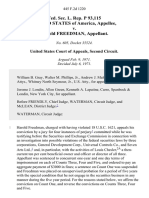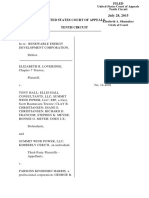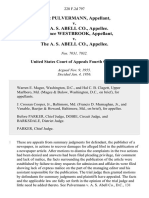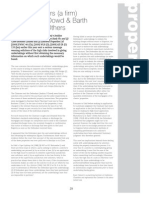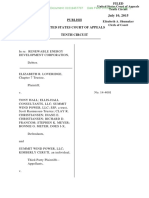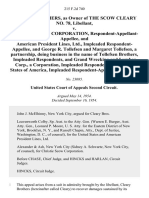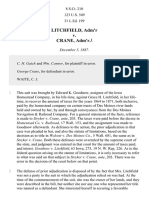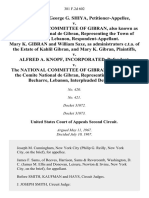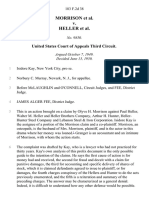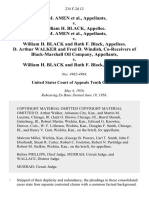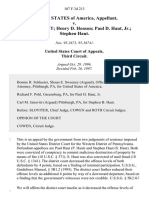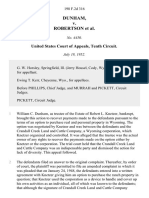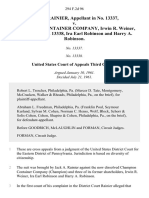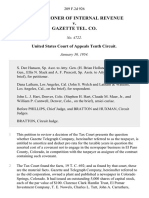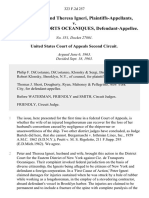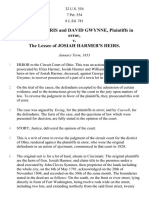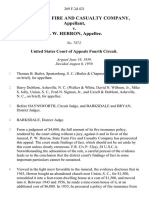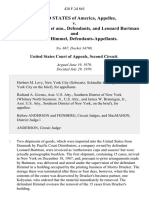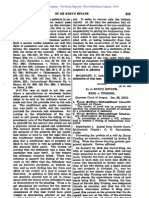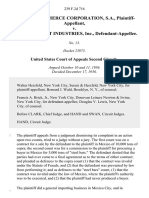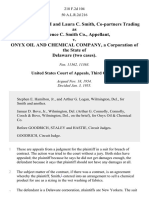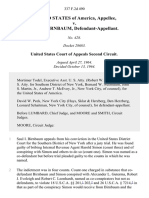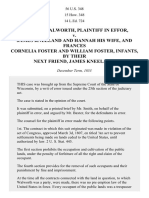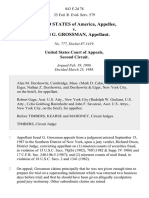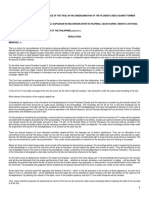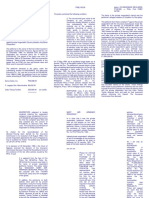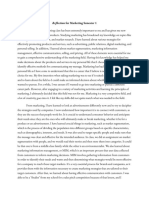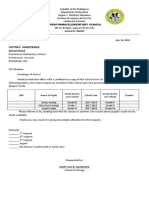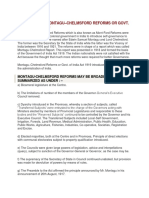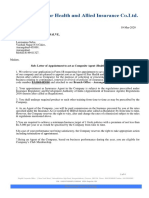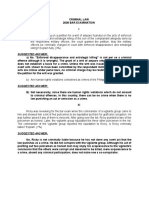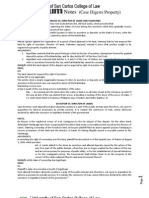De Jesus - The Negotiation
De Jesus - The Negotiation
Uploaded by
Rose De JesusCopyright:
Available Formats
De Jesus - The Negotiation
De Jesus - The Negotiation
Uploaded by
Rose De JesusOriginal Title
Copyright
Available Formats
Share this document
Did you find this document useful?
Is this content inappropriate?
Copyright:
Available Formats
De Jesus - The Negotiation
De Jesus - The Negotiation
Uploaded by
Rose De JesusCopyright:
Available Formats
Chapter 12: The Negotiation
For three days, Schlichtmann, Conway, Crowley, Kiley, Gordon, Phillips sat at the conference
room at their law firm. They pondered on the best course to pursue in light of the aftermath of the
jury’s verdict with regard to the Woburn case, particularly W.R. Grace. Considering their financial
situation as well as the peculiar date - September 1973 – that the jury had given as to when the
chemicals from W.R. Grace had permeated Well G and H in substantial amounts which would
inevitably mean that Judge Skinner would have to dismiss the three cases of leukemia that occurred
prior to the aforementioned date, Schlichtmann and his partners resolved that proceeding with the
medical phase of the trial would not be advisable. Therefore, they resolved that the best course to
pursue is a settlement agreement with W.R. Grace. Pursuant to this, they all agreed that they would
ask W.R. Grace for a thirty-five million dollar settlement and after possible negotiations, would settle
for twenty-five million dollars. Thereafter, Schlichtmann reached out to Keating who in turn said that
the W.R. Grace executive vice president and general counsel, Alber Eustis would fly up to Boston for
a settlement conference.
The settlement conference, held at Lafayette Hotel, did not get off at a great start as Eustis, “a
nuts-and-bolts man”,1 was not interested nor participated in any small talk or pleasantries. He wanted
to immediately get down to business and asked for the figures for the settlement. After hearing Phillips
deliver the settlement plan, Eustis, to the surprise of all the counsel, seemed pleased and immediately
agreeable, and informed Schlichtmann that he would first need to confer with W.R. Grace’s board of
directors.
Schlichtmann and his team flew down to New York for their settlement negotiation with
Albert Eustis at W.R. Grace’s corporate headquarters. After almost three hours of negotiation,
Schlichtmann informed the rest of the team that W.R. Grace unfortunately offered only “six point six
million, take it or leave it”.2
Thereafter, Schlichtmann and his team started making a new settlement agreement which
would keep Woburn at peace and would give W.R. Grace a positive perception from the public. Their
plan was that “Keating would file a motion for a new trial. Keating would ask the judge to vacate the
verdict on the grounds that it was against the weight of evidence. Schlichtmann would consent to this
motion. He would let the judge know that his consent was part of a settlement agreement. A new trial
would make it look as if Grace wasn’t really guilty. They could even have the families say to the press
that Beatrice and chemical companies in north Woburn were responsible for the contamination of the
wells”.3
After numerous back and forth negotiations with Albert Eustis, the settlement agreement had
stopped at eight million dollars wherein in each Woburn family involved in the case would receive
half a million dollars.
1
Jonathan Harr, A Civil Action (New York: Vintage Books, 1995), 409.
2
Jonathan Harr, A Civil Action, 414.
3
Jonathan Harr, A Civil Action, 422.
You might also like
- Civil Action SummaryDocument6 pagesCivil Action Summaryroxskulet7100% (3)
- Lea 3: Introduction To Industrial Security ConceptsDocument10 pagesLea 3: Introduction To Industrial Security ConceptsLorelene Romero100% (3)
- Noel Navaja v. Manuel A. de CastroDocument2 pagesNoel Navaja v. Manuel A. de CastroDerick Torres100% (2)
- JMM Promotion and Management Vs Court of AppealsDocument2 pagesJMM Promotion and Management Vs Court of AppealsKaren Feyt Mallari90% (10)
- Letter of SubrogationDocument3 pagesLetter of SubrogationDhin Mohammed Morshed100% (3)
- Annette Heyman, Individually v. Robert S. Kline, 456 F.2d 123, 2d Cir. (1972)Document12 pagesAnnette Heyman, Individually v. Robert S. Kline, 456 F.2d 123, 2d Cir. (1972)Scribd Government DocsNo ratings yet
- S. D. Hatfield and Nancy C. Rutherford, Appts. v. Henry C. King, 184 U.S. 162 (1901)Document6 pagesS. D. Hatfield and Nancy C. Rutherford, Appts. v. Henry C. King, 184 U.S. 162 (1901)Scribd Government DocsNo ratings yet
- United States Court of Appeals Fourth CircuitDocument3 pagesUnited States Court of Appeals Fourth CircuitScribd Government DocsNo ratings yet
- Shilling V Accidental Death Ins CoDocument3 pagesShilling V Accidental Death Ins CoAisha MillerNo ratings yet
- United States v. Ellington, 348 F.3d 984, 11th Cir. (2003)Document10 pagesUnited States v. Ellington, 348 F.3d 984, 11th Cir. (2003)Scribd Government DocsNo ratings yet
- United States v. Milton Brechner, 99 F.3d 96, 2d Cir. (1996)Document7 pagesUnited States v. Milton Brechner, 99 F.3d 96, 2d Cir. (1996)Scribd Government DocsNo ratings yet
- Hoyt v. Latham, 143 U.S. 553 (1892)Document13 pagesHoyt v. Latham, 143 U.S. 553 (1892)Scribd Government DocsNo ratings yet
- Facher's PleaDocument2 pagesFacher's PleaRyan BalladaresNo ratings yet
- United States Court of Appeals, Third CircuitDocument10 pagesUnited States Court of Appeals, Third CircuitScribd Government DocsNo ratings yet
- Rule 11 - A Civil Action by Jonathan HarrDocument1 pageRule 11 - A Civil Action by Jonathan HarrEveBNo ratings yet
- John Leach, Intervenor v. Crucible Center Company, 388 F.2d 176, 1st Cir. (1968)Document7 pagesJohn Leach, Intervenor v. Crucible Center Company, 388 F.2d 176, 1st Cir. (1968)Scribd Government DocsNo ratings yet
- United States v. Hasner, 340 F.3d 1261, 11th Cir. (2003)Document19 pagesUnited States v. Hasner, 340 F.3d 1261, 11th Cir. (2003)Scribd Government DocsNo ratings yet
- Riley v. Harr, 292 F.3d 282, 1st Cir. (2002)Document23 pagesRiley v. Harr, 292 F.3d 282, 1st Cir. (2002)Scribd Government DocsNo ratings yet
- United States Court of Appeals, Ninth CircuitDocument8 pagesUnited States Court of Appeals, Ninth CircuitScribd Government DocsNo ratings yet
- Griese-Traylor Corporation, A Florida Corporation v. The First National Bank of Birmingham, A National Banking Association, 572 F.2d 1039, 1st Cir. (1978)Document9 pagesGriese-Traylor Corporation, A Florida Corporation v. The First National Bank of Birmingham, A National Banking Association, 572 F.2d 1039, 1st Cir. (1978)Scribd Government DocsNo ratings yet
- Julius Long Stern and Ellen v. Stern v. Commissioner of Internal Revenue, 215 F.2d 701, 3rd Cir. (1954)Document10 pagesJulius Long Stern and Ellen v. Stern v. Commissioner of Internal Revenue, 215 F.2d 701, 3rd Cir. (1954)Scribd Government DocsNo ratings yet
- United States v. Schiller, 187 F.2d 572, 2d Cir. (1951)Document6 pagesUnited States v. Schiller, 187 F.2d 572, 2d Cir. (1951)Scribd Government DocsNo ratings yet
- McGowan v. Parish, 237 U.S. 285 (1915)Document11 pagesMcGowan v. Parish, 237 U.S. 285 (1915)Scribd Government DocsNo ratings yet
- Galpin v. Page, 85 U.S. 350 (1874)Document21 pagesGalpin v. Page, 85 U.S. 350 (1874)Scribd Government DocsNo ratings yet
- Klein v. Hoffheimer, 132 U.S. 367 (1889)Document9 pagesKlein v. Hoffheimer, 132 U.S. 367 (1889)Scribd Government DocsNo ratings yet
- Fed. Sec. L. Rep. P 93,115 United States of America v. Harold Freedman, 445 F.2d 1220, 2d Cir. (1971)Document11 pagesFed. Sec. L. Rep. P 93,115 United States of America v. Harold Freedman, 445 F.2d 1220, 2d Cir. (1971)Scribd Government DocsNo ratings yet
- Loveridge v. Hall, 10th Cir. (2015)Document21 pagesLoveridge v. Hall, 10th Cir. (2015)Scribd Government DocsNo ratings yet
- Heinz Pulvermann v. The A. S. Abell Co., Lawrence Westbrook v. The A. S. Abell Co., 228 F.2d 797, 4th Cir. (1956)Document9 pagesHeinz Pulvermann v. The A. S. Abell Co., Lawrence Westbrook v. The A. S. Abell Co., 228 F.2d 797, 4th Cir. (1956)Scribd Government DocsNo ratings yet
- Burlesque Artists Association v. I. Hirst Enterprises, Inc., and Jay Hornick, 267 F.2d 414, 3rd Cir. (1959)Document5 pagesBurlesque Artists Association v. I. Hirst Enterprises, Inc., and Jay Hornick, 267 F.2d 414, 3rd Cir. (1959)Scribd Government DocsNo ratings yet
- Filed: Patrick FisherDocument41 pagesFiled: Patrick FisherScribd Government DocsNo ratings yet
- Angel Solicitors (A Firm) V Jenkins O'Dowd & Barth (A Firm) and Others by Ryan Clement BarristerDocument1 pageAngel Solicitors (A Firm) V Jenkins O'Dowd & Barth (A Firm) and Others by Ryan Clement BarristerRyan Clement100% (1)
- 2015 07 10 Reversed - Remanded DecisionDocument21 pages2015 07 10 Reversed - Remanded DecisionThe PetroglyphNo ratings yet
- United States v. Brian S. Grimmond, 137 F.3d 823, 4th Cir. (1998)Document19 pagesUnited States v. Brian S. Grimmond, 137 F.3d 823, 4th Cir. (1998)Scribd Government DocsNo ratings yet
- United States Court of Appeals Second CircuitDocument5 pagesUnited States Court of Appeals Second CircuitScribd Government DocsNo ratings yet
- Litchfield v. Goodnow's Administrator, 123 U.S. 549 (1887)Document3 pagesLitchfield v. Goodnow's Administrator, 123 U.S. 549 (1887)Scribd Government DocsNo ratings yet
- United States v. Beltran, 10th Cir. (2006)Document9 pagesUnited States v. Beltran, 10th Cir. (2006)Scribd Government DocsNo ratings yet
- United States v. Field, 193 F.2d 92, 2d Cir. (1952)Document26 pagesUnited States v. Field, 193 F.2d 92, 2d Cir. (1952)Scribd Government DocsNo ratings yet
- United States Court of Appeals Second Circuit.: No. 420. No. 421. Docket 31072. Docket 31073Document11 pagesUnited States Court of Appeals Second Circuit.: No. 420. No. 421. Docket 31072. Docket 31073Scribd Government DocsNo ratings yet
- Morrison v. Heller, 183 F.2d 38, 3rd Cir. (1950)Document8 pagesMorrison v. Heller, 183 F.2d 38, 3rd Cir. (1950)Scribd Government DocsNo ratings yet
- Karl Horn and Lois Horn v. Robert B. Daniel and Le Roy Bacon, 315 F.2d 471, 10th Cir. (1963)Document5 pagesKarl Horn and Lois Horn v. Robert B. Daniel and Le Roy Bacon, 315 F.2d 471, 10th Cir. (1963)Scribd Government DocsNo ratings yet
- United States Court of Appeals Tenth CircuitDocument29 pagesUnited States Court of Appeals Tenth CircuitScribd Government DocsNo ratings yet
- United States v. Agatha R. Haut Henry D. Henson Paul D. Haut, Jr. Stephen Haut, 107 F.3d 213, 3rd Cir. (1997)Document15 pagesUnited States v. Agatha R. Haut Henry D. Henson Paul D. Haut, Jr. Stephen Haut, 107 F.3d 213, 3rd Cir. (1997)Scribd Government DocsNo ratings yet
- John C. Frank, Plaintiff-Cross v. Victoria Bloom, 634 F.2d 1245, 10th Cir. (1980)Document18 pagesJohn C. Frank, Plaintiff-Cross v. Victoria Bloom, 634 F.2d 1245, 10th Cir. (1980)Scribd Government DocsNo ratings yet
- Dunham v. Robertson, 198 F.2d 316, 10th Cir. (1952)Document5 pagesDunham v. Robertson, 198 F.2d 316, 10th Cir. (1952)Scribd Government DocsNo ratings yet
- Yetta Freeman v. Bob Heiman, 426 F.2d 1050, 10th Cir. (1970)Document5 pagesYetta Freeman v. Bob Heiman, 426 F.2d 1050, 10th Cir. (1970)Scribd Government DocsNo ratings yet
- Jack A. Rainier, in No. 13337 v. Champion Container Company, Irwin R. Weiner, in No. 13338, Ira Earl Robinson and Harry A. Robinson, 294 F.2d 96, 3rd Cir. (1961)Document12 pagesJack A. Rainier, in No. 13337 v. Champion Container Company, Irwin R. Weiner, in No. 13338, Ira Earl Robinson and Harry A. Robinson, 294 F.2d 96, 3rd Cir. (1961)Scribd Government DocsNo ratings yet
- Commissioner of Internal Revenue v. Gazette Tel. Co, 209 F.2d 926, 10th Cir. (1954)Document4 pagesCommissioner of Internal Revenue v. Gazette Tel. Co, 209 F.2d 926, 10th Cir. (1954)Scribd Government DocsNo ratings yet
- United States v. Marvin Maultasch and Richard D. Reddock, 596 F.2d 19, 2d Cir. (1979)Document12 pagesUnited States v. Marvin Maultasch and Richard D. Reddock, 596 F.2d 19, 2d Cir. (1979)Scribd Government DocsNo ratings yet
- Sawyer v. United States, 202 U.S. 150 (1906)Document11 pagesSawyer v. United States, 202 U.S. 150 (1906)Scribd Government DocsNo ratings yet
- Peter Igneri and Theresa Igneri v. Cie. de Transports Oceaniques, 323 F.2d 257, 2d Cir. (1963)Document16 pagesPeter Igneri and Theresa Igneri v. Cie. de Transports Oceaniques, 323 F.2d 257, 2d Cir. (1963)Scribd Government DocsNo ratings yet
- Morris v. Lessee of Harmer's Heirs, 32 U.S. 554 (1833)Document11 pagesMorris v. Lessee of Harmer's Heirs, 32 U.S. 554 (1833)Scribd Government DocsNo ratings yet
- In Re Grand Jury Subpoena Duces Tecum Dated April 19, 1991. United States of America v. John Doe, Esq., Continental Holdings, Inc., and Continental Airlines, Inc., Intervenors-Appellants, 945 F.2d 1221, 2d Cir. (1991)Document8 pagesIn Re Grand Jury Subpoena Duces Tecum Dated April 19, 1991. United States of America v. John Doe, Esq., Continental Holdings, Inc., and Continental Airlines, Inc., Intervenors-Appellants, 945 F.2d 1221, 2d Cir. (1991)Scribd Government DocsNo ratings yet
- State Farm Fire and Casualty Company v. P. W. Herron, 269 F.2d 421, 4th Cir. (1959)Document8 pagesState Farm Fire and Casualty Company v. P. W. Herron, 269 F.2d 421, 4th Cir. (1959)Scribd Government DocsNo ratings yet
- Applegate v. Lexington & Carter County Mining Co., 117 U.S. 255 (1886)Document10 pagesApplegate v. Lexington & Carter County Mining Co., 117 U.S. 255 (1886)Scribd Government DocsNo ratings yet
- United States v. Charles Tourine Et Ano., and Leonard Burtman and Benedict Himmel, 428 F.2d 865, 2d Cir. (1970)Document7 pagesUnited States v. Charles Tourine Et Ano., and Leonard Burtman and Benedict Himmel, 428 F.2d 865, 2d Cir. (1970)Scribd Government DocsNo ratings yet
- American Insurance Company v. Mart Lester and Ed Lester, Individually, and Doing Business As Lester Coal Company, and Correale Mining Corporation, 233 F.2d 778, 4th Cir. (1956)Document5 pagesAmerican Insurance Company v. Mart Lester and Ed Lester, Individually, and Doing Business As Lester Coal Company, and Correale Mining Corporation, 233 F.2d 778, 4th Cir. (1956)Scribd Government DocsNo ratings yet
- 1687 The Pacific Reporter 319aDocument2 pages1687 The Pacific Reporter 319aRichard TonsingNo ratings yet
- Global Commerce Corporation, S.A. v. Clark-Babbitt Industries, Inc., 239 F.2d 716, 2d Cir. (1956)Document6 pagesGlobal Commerce Corporation, S.A. v. Clark-Babbitt Industries, Inc., 239 F.2d 716, 2d Cir. (1956)Scribd Government DocsNo ratings yet
- Box v. Rundell, 179 F.2d 626, 10th Cir. (1950)Document4 pagesBox v. Rundell, 179 F.2d 626, 10th Cir. (1950)Scribd Government DocsNo ratings yet
- Laurence C. Smith and Laura C. Smith, Co-Partners Trading As Laurence C. Smith Co. v. Onyx Oil and Chemical Company, A Corporation of The State of Delaware (Two Cases), 218 F.2d 104, 3rd Cir. (1955)Document10 pagesLaurence C. Smith and Laura C. Smith, Co-Partners Trading As Laurence C. Smith Co. v. Onyx Oil and Chemical Company, A Corporation of The State of Delaware (Two Cases), 218 F.2d 104, 3rd Cir. (1955)Scribd Government DocsNo ratings yet
- United States v. Saul I. Birnbaum, 337 F.2d 490, 2d Cir. (1964)Document13 pagesUnited States v. Saul I. Birnbaum, 337 F.2d 490, 2d Cir. (1964)Scribd Government DocsNo ratings yet
- Walworth v. Kneeland, 56 U.S. 348 (1854)Document7 pagesWalworth v. Kneeland, 56 U.S. 348 (1854)Scribd Government DocsNo ratings yet
- United States v. Israel G. Grossman, 843 F.2d 78, 2d Cir. (1988)Document13 pagesUnited States v. Israel G. Grossman, 843 F.2d 78, 2d Cir. (1988)Scribd Government DocsNo ratings yet
- Saa v. Ibp-CbdDocument2 pagesSaa v. Ibp-CbdRose De JesusNo ratings yet
- Abay v. MontesinoDocument4 pagesAbay v. MontesinoRose De JesusNo ratings yet
- Endaya v. OcaDocument6 pagesEndaya v. OcaRose De Jesus100% (1)
- Heirs of Falame v. BaguioDocument4 pagesHeirs of Falame v. BaguioRose De JesusNo ratings yet
- Sanchez V AguilosDocument9 pagesSanchez V AguilosRose De JesusNo ratings yet
- Respondent," Pending Before The Municipal Trial Court, Branch 1, Binangonan, RizalDocument5 pagesRespondent," Pending Before The Municipal Trial Court, Branch 1, Binangonan, RizalRose De JesusNo ratings yet
- Barnachea v. QuiochoDocument5 pagesBarnachea v. QuiochoRose De JesusNo ratings yet
- Nakpil v. ValdesDocument8 pagesNakpil v. ValdesRose De JesusNo ratings yet
- Herman D. Coloma For Petitioners. Jorge S. Castillo For Private RespondentDocument5 pagesHerman D. Coloma For Petitioners. Jorge S. Castillo For Private RespondentRose De JesusNo ratings yet
- Rayos v. HernandezDocument8 pagesRayos v. HernandezRose De JesusNo ratings yet
- Malonzo v. PrincipeDocument11 pagesMalonzo v. PrincipeRose De JesusNo ratings yet
- Floran v. EDIZADocument3 pagesFloran v. EDIZARose De JesusNo ratings yet
- BUENO v. RAÑESESDocument4 pagesBUENO v. RAÑESESRose De JesusNo ratings yet
- Perez v. EstradaDocument2 pagesPerez v. EstradaRose De JesusNo ratings yet
- Guerrero v. VillamorDocument3 pagesGuerrero v. VillamorRose De JesusNo ratings yet
- Masinsin v. AlbanoDocument3 pagesMasinsin v. AlbanoRose De JesusNo ratings yet
- Letter of Atty. Cecilio Y. Arevalo, JR., Requesting Exemption From Payment of Ibp Dues.Document3 pagesLetter of Atty. Cecilio Y. Arevalo, JR., Requesting Exemption From Payment of Ibp Dues.Rose De JesusNo ratings yet
- In Re Vicente SottoDocument1 pageIn Re Vicente SottoRose De JesusNo ratings yet
- Rivera-Pascual V LimDocument3 pagesRivera-Pascual V LimRose De JesusNo ratings yet
- PNB v. CEDODocument2 pagesPNB v. CEDORose De JesusNo ratings yet
- Rodriguez-Manahan V FloresDocument2 pagesRodriguez-Manahan V FloresRose De JesusNo ratings yet
- Query of Atty. Karen M. Silverio-Buffe, Former Clerk of Court - Branch 81, Romblon, Romblon - On The Prohibition From Engaging in The Private Practice of Law.Document6 pagesQuery of Atty. Karen M. Silverio-Buffe, Former Clerk of Court - Branch 81, Romblon, Romblon - On The Prohibition From Engaging in The Private Practice of Law.Rose De JesusNo ratings yet
- Baizas and Balderrama For Petitioner. City Attorney Francisco G. H. Salva in His Own BehalfDocument3 pagesBaizas and Balderrama For Petitioner. City Attorney Francisco G. H. Salva in His Own BehalfRose De JesusNo ratings yet
- Geagonia vs. CA, February 6, 1995Document5 pagesGeagonia vs. CA, February 6, 1995Kimberly SendinNo ratings yet
- Sherry & Kuria Full Wedding Plan (Final)Document16 pagesSherry & Kuria Full Wedding Plan (Final)JOshNo ratings yet
- Miguel Angel Aguirre-Barron, A201 217 294 (BIA Nov. 29, 2012)Document7 pagesMiguel Angel Aguirre-Barron, A201 217 294 (BIA Nov. 29, 2012)Immigrant & Refugee Appellate Center, LLCNo ratings yet
- Student Financial Assistance Programs StuFAPs CMO No.56 S. 2012Document2 pagesStudent Financial Assistance Programs StuFAPs CMO No.56 S. 2012Erron IgnacioNo ratings yet
- Basic Principles of Deontology Concepts of Agency and Autonomy Evaluating Actions Using UniversalizabiliyDocument14 pagesBasic Principles of Deontology Concepts of Agency and Autonomy Evaluating Actions Using UniversalizabiliyAlexis Gail DizonNo ratings yet
- Quieting of Title: Heirs of Simplicio Santiago v. Heirs of Mariano E. SantiagoDocument2 pagesQuieting of Title: Heirs of Simplicio Santiago v. Heirs of Mariano E. SantiagoRey ObnimagaNo ratings yet
- Affidavit of Loss Fleet CardDocument1 pageAffidavit of Loss Fleet CardNLainie OmarNo ratings yet
- Notice (Withdrawal The Affidavits of Victor Mignogna, Chuck Huber and Christopher Slatosch)Document1 pageNotice (Withdrawal The Affidavits of Victor Mignogna, Chuck Huber and Christopher Slatosch)Anonymous RtqI2MNo ratings yet
- Marketing ReflectionDocument2 pagesMarketing ReflectionSally TNo ratings yet
- Laurel V Desierto DigestDocument1 pageLaurel V Desierto DigestPrincess Trisha Joy UyNo ratings yet
- List of Dates and EvetsDocument4 pagesList of Dates and EvetsRahul SisodiaNo ratings yet
- Legal Ethics Case DigestDocument18 pagesLegal Ethics Case DigestVinz G. VizNo ratings yet
- Request For Form 137eDocument8 pagesRequest For Form 137eJun Cueva ComerosNo ratings yet
- The Two Principal Remedies Available To The Victim of A Tort Are Damages To Compensate For The Harm He Has Suffered and 1Document4 pagesThe Two Principal Remedies Available To The Victim of A Tort Are Damages To Compensate For The Harm He Has Suffered and 1Rose Erina AzreenNo ratings yet
- People of The Philippines v. Saiben LangcuaDocument3 pagesPeople of The Philippines v. Saiben Langcua楊瑪莉No ratings yet
- Montagu-Chelmsford ReDocument2 pagesMontagu-Chelmsford RemaanaNo ratings yet
- Rti Act 2005Document24 pagesRti Act 2005vineetNo ratings yet
- Counter AffidavitDocument2 pagesCounter AffidavitFreeNo ratings yet
- Admission Fee Slip Abasyn UniDocument2 pagesAdmission Fee Slip Abasyn UniGMMarwatNo ratings yet
- Ms - Sarla Laxmanrao Salve, BA0000485000Document4 pagesMs - Sarla Laxmanrao Salve, BA0000485000hiteshmohakar15No ratings yet
- Rights and Liabilities of PromotersDocument9 pagesRights and Liabilities of PromotersSyed Huzaifa Ahmed (Larf Nalavale)No ratings yet
- Affadavit Example1Document2 pagesAffadavit Example1AndyJackson100% (3)
- Petitioner Vs Vs Respondent: Third DivisionDocument8 pagesPetitioner Vs Vs Respondent: Third Divisionbrandon dawisNo ratings yet
- People Vs Bolanos 211 SCRA 262Document3 pagesPeople Vs Bolanos 211 SCRA 262MWinbee VisitacionNo ratings yet
- 2008 Crim Bar QuestionsDocument2 pages2008 Crim Bar QuestionsClrz100% (1)
- Prop Case DigestsDocument39 pagesProp Case DigestsRaz SP100% (5)
